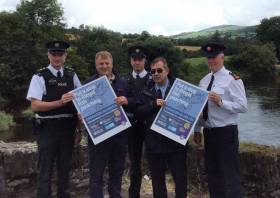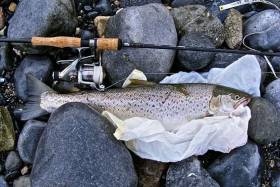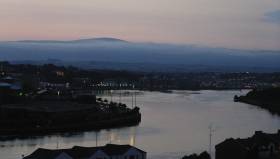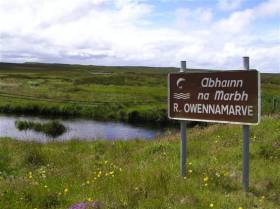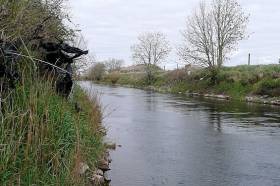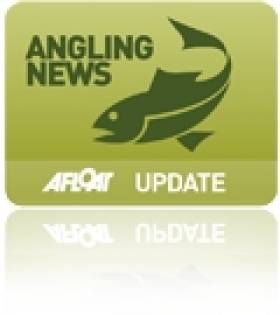Displaying items by tag: poaching
Poaching Is Driving Anglers Away From Sport, Seanad Hears
The scale of poaching in some Irish rivers is so great that anglers are being driven away from the sport, the Seanad has heard.
Senator Garret Ahearn raised concerns from the angling community amid a decline in the rate of prosecutions for fisheries offences in the latest figures from Inland Fisheries Ireland (IFI).
And as the Irish Independent reports, he argued that action must be taken to protect both valuable stocks of salmon and sea trout, and the anglers and clubs who fish for them.
“Many people are poaching fish from [the River Suir] and essentially getting away with it,” Senator Ahearn said. “The fishermen who fish in it every week, who catch and release, feel like they have to manage the river themselves.”
The senator added that there is a feeling among anglers that protection “is not happening to the extent it should” — though IFI insists it is working to protect national fish stocks and support the angling sector.
The Irish Independent has more on the story HERE.
Three men have been fined in relation to the illegal capture of 27 salmon and the use of 861 metres of illegal nets off the coast of Mayo.
Patrick O’Donnell, Milan Funket, and Marek Radomsky were observed by Inland Fisheries Ireland (IFI) officers setting drift nets from a boat, skippered by O’Donnell, which were later retrieved at Porturlin, North Mayo.
O’Donnell, Funket and Radomsky appeared before Belmullet District Court on Wednesday 14 June, charged with the offences.
The court was told that O’Donnell was the “ringleader” in the operation. He was convicted and fined a total of €3,000 for breaches of fisheries legislation, a further €1,000 in expenses to IFI and €1,845 in costs to IFI.
Funket was fined €750 for the possession of a net and Radomsky was fined €1,000 for the possession of illegally captured salmon.
Judge Fiona Lydon heard evidence from Inspector Lonan O’Farrell of IFI, that on 17 June 2022 he observed the three men setting a drift net from the boat, the Cailin Ban.
The net was later retrieved and placed in the boat, following which the Cailin Ban headed for Porturlin pier.
On its arrival at the pier a crew member disembarked, and the illegally caught salmon were put into a van. IFI officers intercepted the van at the pier, cautioned and questioned the driver, and seized the 27 salmon.
However, despite efforts by IFI fisheries officers to speak to the crew, the boat returned to sea and three bags were seen thrown overboard.
The Cailin Ban re-entered Porturlin pier where IFI officers boarded the boat and cautioned the two men on board. IFI personnel later retrieved the bags with the illegal drift nets that had been discarded at sea.
Francis O’Donnell, chief executive of IFI said: “The scale of this illegal salmon netting at sea was at a commercial level, and posed a significant threat to our wild Atlantic salmon stocks. It is a serious environmental crime, and such crimes will not be tolerated by IFI.”
Mary Walsh, IFI’s director of the Western River Basin District in Ballina added: “I commend the coordinated response of our dedicated teams. There were many factors contributing to the success of this operation, including intelligence, leadership, and planning, as well as the availability and use of specialised equipment.”
‘Operation Silver Fin’ To Tackle Fish Poaching In Co Tyrone
The Loughs Agency has teamed up with police on both sides of the border and a local wildlife group in a joint initiative to tackle fish poaching in Co Tyrone, as Independent.ie reports.
‘Operation Silver Fin’ will take on the scourge of wildlife crime in the area, with a focus on enforcing existing fishing regulations to protect an important angling resource.
Fish poaching, which uses long lines and nets, is only permitted in certain areas — while anyone angling requires a licence and must follow strict rules around where, when and how they fish.
Independent.ie has more on the story HERE.
Galway Man Convicted of Poaching Offence
At a sitting of Galway and District Court on the 7th of February 2017, Judge Mary Fahy convicted Mr. Gerry Farragher of Rinnaharney, Annaghdown, Co. Galway, for the illegal use of a net to catch salmon, in breach of Section 96 of the Fisheries Act, 1959. Mr. Farragher pleaded guilty to the charge in court.
Solicitor Dioraí Ford, representing Inland Fisheries Ireland, outlined the facts of the case. Mr. Ford explained that Fisheries Officers had found the net in question on Lough Corrib at 3.10am on the night of the 5th of July, 2016. The officers lay in wait until 11.25am when Mr Farragher approached the area and serviced the net by wading from the shore to an island. On leaving the area he was apprehended by the Fisheries Officers on duty.
Mr. Farragher told the Judge that it was only a small bit of net on his own land however Judge Fahy disagreed, commenting that wild salmon are very scarce these days. She also pointed out that it would be cheaper to visit a restaurant to eat salmon rather than paying fines in court.
Judge Fahy heard that Mr. Farragher had been convicted and fined in 2014 for netting and taking salmon from the same area. Mr. Farragher confirmed that he had paid his previous fines, and the judge stated that if he persisted in this activity, a prison sentence would be considered if he appeared before the court again.
Mr. Farragher was fined €500 plus costs of €600 and given six months to pay while the net in question was forfeited.
Dr Ciaran Byrne, CEO of Inland Fisheries Ireland said: “Lough Corrib is one of Ireland’s renowned angling destinations, known for its wild brown trout and salmon fishing. It is a shame to see individuals continuing to illegally fish the area, an action which is essentially an environmental crime.
We are delighted with the outcome of this case which highlights that those who are caught will be held accountable. Our Fisheries Officers patrol the waterways in overt and covert operations with a view to protecting the wild fish populations in this area.”
Poaching Threat To Connemara Angling Tourism
#Angling - Poaching is a direct threat to efforts to revive salmon and trout angling and associated tourism in Connemara, a local business has warned.
Brian Curran of Lough Corrib-based Ireland West Angling told the Connacht Tribune that poachers are doing “untold damage to rehabilitation efforts” in Spiddal and environs, following a recent conviction of a local man for unlawful netting on the Boluisce River.
Such illegal practices disturb the painstaking work of Inland Fisheries Ireland staff and local registered fisheries to clear obstructions and place spawning gravel to aid fish in their migration.
The story comes weeks after Northern Irish anglers expressed their own concerns over poaching and pollution in the Carlingford and Lough Foyle areas, as previously reported on Afloat.ie.
NI Anglers Concerned By Rise In Pollution & Poaching
#Angling - Pollution and poaching are a growing concern for anglers in the Carlingford and Lough Foyle areas, as Derek Evans reports in his latest Angling Notes for The Irish Times.
New figures from the Loughs Agency reveal a significant raise in pollution, the worst incident of which occurred this past August when hundreds of salmon fry were lost in a fish kill on the River Faughan, according to the Derry Journal.
In addition, the Loughs Agency report informed NI Environment Minister Michelle McIlveen of almost double the number of fishing gear seizures this year compared to 2015, as well as a sharp rise in court actions.
The Irish Times has more on the story HERE.
#Angling - A retired shellfish farmer was convicted of poaching fish from the Owennamarve River near Dungloe in July 2014 at a recent sitting of Dungloe District Court.
Jimmy Sweeney was ordered to pay €800 in a fine and costs.
The court was told that Inland Fisheries Ireland (IFI) officers saw Sweeney using a fishing engine for the capture of salmon and possessing a net for taking prohibited fish from the Owennamarve River.
The defendant denied the offence but did not give evidence to the court. His defence solicitor failed in a bid to satisfy the court that there was a fault in the way Sweeney was cautioned by the officers.
IFI officer Seamus Bradley, who patrolled the area of Derrydruel Upper, Dungloe with two other officers on 15 July 2014, told the court that he spotted a net on the river with binoculars and a telescope.
He then saw a man walking downstream towards the net and stopping at it before concealing himself behind a rock close to the net. Some minutes later then man reappeared and began retrieving the net and putting it into a bag.
Bradley testified that he contacted his fellow officers at that stage and asked them to move and contact the man he was observing. When the man noticed the officers’ jeep, he went downstream and placed a bag behind a large rock.
IFI officer Owen Kelly was informed of this and recovered the bag from behind the rock. It contained a 12m-long multi-monofilament salmon net.
IFI chief executive Dr Ciaran Byrne commented: “The Owennamarve River, a private fishery owned by the Rosses anglers, has been closed since 2006 for salmon fishing and capture of sea trout over 40cm.
"Salmon angling is extremely valuable to the tourism industry and provides revenue, employment to local communities, as well as recreation to thousands of local anglers around Ireland. Inland Fisheries Ireland will continue to work to protect this resource for the good of the community.”
IFI has a confidential hotline number to enable members of the general public to report incidents at 1890 34 74 24 or 1890 FISH 24. This phone line is designed to encourage the reporting of incidents of illegal fishing, water pollution and invasive species.
Claregalway Man Convicted Of Poaching Offences
#Poaching - A Claregalway man was convicted of an illegal fishing offence at a sitting of Galway District Court recently.
Niall O’Gorman, with an address at Kiltrogue, Claregalway, was found guilty on 2 February of possession of a net and obstruction of fishery officers at Kiltrogue on the Clare River on 27 May 2015.
Fines of €500 were issued on each charge, totalling €1,000, and costs were awarded to Inland Fisheries Ireland to the amount of €600.
Judge Mary Fahy heard evidence that fishery officers on patrol in the early hours of 27 May observed the defendant in a kayak, servicing and cleaning a net, before placing it in a bag. He then proceeded to a second net, fixed in the river, where the officers approached him.
O’Gorman made an attempt to flee in the kayak, necessitating one of the fishery officers entering the water to apprehend him.
The solicitor for the defendant asked for leniency, stating that her client had made a stupid mistake, that he was of limited means and that he accepted the serious nature of the offence.
Judge Fahy said that the defendant was obviously not a teenager and had acted in a very immature way. She commented further that she had heard a number of fishery cases recently and that this was the most serious, necessitating an officer to enter the water in the early hours of the morning.
The nets were forfeited, although the kayak was returned to O’Gorman, who gave an undertaking in court not to use the kayak for anything other than kayaking in the future.
Commenting on the case, John Conneely of Inland Fisheries Ireland commended the fisheries officers involved. He said: “Protection of fish stocks is vital to maintaining an extremely valuable natural resource for the benefit of local and tourist anglers. Recreational angling in Ireland is worth over €836 million to the economy and supports over 11,000 jobs.
"IFI staff are committed to protecting that resource, working in difficult conditions and bad weather to do so, and their vigilance and dedication is highly valued.”
Dr Ciaran Byrne, CEO of Inland Fisheries Ireland, said: “The Clare River has unfortunately been the victim of environmental crime once again. This activity must be stopped to ensure that the important recreational amenity and its biodiversity are conserved for future generations.”
Two Convicted of Poaching on Clare River
Two men were convicted of poaching offences at Tuam District Court on Tuesday, 12th of January 2016, following a surveillance operation by officers of Inland Fisheries Ireland (IFI).
The two men, both from Boyounagh, Glenamaddy, were before the court on charges relating to an incident that occurred on 5th January 2015. Judge Geoffrey Browne heard evidence from the prosecuting solicitor, Mr Diorai Ford, that on the date in question Fishery Officers had observed the two men using a light to locate spawning salmon with a view to spearing them in a spawning stream of the Clare River. A search of the vehicle they were driving resulted in the seizure of additional high powered lamps and a fork specially modified with barbs to spear salmon.
Judge Browne convicted Ben Conneally of the illegal use of a spear, and fined him €200 with €350 costs. He also convicted Michael Collins of the illegal use of a light on the riverbank, and also fined him €200 with €350 costs. The Judge inquired had the two men caught any salmon on the night in question, and when informed they had not, he remarked that it would have been cheaper for them to go to a fish shop. He also ordered the forfeiture of the equipment seized on the night.
Commenting on the case, Dr John Conneely, Director of the Western River Basin District for IFI, said: “This case demonstrates that illegal fishing is not just a summer problem, and IFI’s protection personnel are on year-round patrol to deter such illegal activity. Salmon angling is extremely valuable to the tourism industry and provides revenue, employment to local communities, as well as recreation to thousands of local anglers around Ireland. Inland Fisheries Ireland will continue to work to protect this resource for the good of the community.”
Dr Ciaran Byrne, CEO of IFI, commended the work of staff who brave the elements to protect the salmon and all inland fisheries resources. He stated: “In this era of reducing staff numbers and resources, IFI continues to protect, conserve, develop and promote fisheries. However, IFI’s ability to maintain its service is being eroded and I urge anglers and the public to report any incidences of poaching or pollution to the IFI 24 hour confidential hotline 1850 347424. A collaborative approach will ensure that local areas benefit from angling, both domestic and tourism, and jobs and communities in local areas are supported.”
Minister Hails IFI's Action Against Illegal Fishing
#Angling - Minister of State Fergus O'Dowd discussed some of the measures being employed to curb illegal fishing at a conference on wildlife crime at the weekend.
Addressing the Irish Wildlife Crime Conference in Ashbourne, Co Meath on Saturday 14 September, the minister highlighted the example of Inland Fisheries Ireland (IFI) and its work in tackling illegal activity in the fisheries sector - following news that angling is worth some three quarters of a billion euro to the Irish economy annually.
"IFI is bringing the fight to the poachers," he said, noting that 28,613 man hours were expended on lake patrols, 17,253 man hours were expended on coastal and estuarine patrols and 115,498 man hours were expended on river patrols in 2012 alone.
"But staff are not just going out randomly on patrol and hoping for the best, they are using all manner and means of equipment to target specific areas and increase efficiency.
"For example, fisheries officers are now using bicycles to access areas quickly such as many river banks. Kayaks are being used to conduct silent patrols along rivers and access areas which previously would have been almost impossible to get into unnoticed.
"Quad bikes are being used on some of the countries beaches to patrol for illegal bass fishing. Personal water craft and kayaks are being used to patrol shallow estuarine areas which previously would have been inaccessible to RIBS."
Fisheries patrols, the minister explained, have also had "significant success in the use of night vision scopes, thermal imaging equipment and covert cameras.
"Night time kayak patrols are now being conducted in pitch darkness with thermal imaging equipment along some of the countries largest river systems, and they have significantly aided in the detection of riverine nets.
"But arguably some of the best successes have come for the use of covert cameras. These cameras are covertly located overlooking a known poaching hotspot, the advantage is that they can use infrared light and operate in pitch darkness and they take an image of the subject and text it to the Fisheries Officer. So we now have a situation where the fisheries officer can actively patrol one area and remotely cover a number of other locations at the same time."
The use of cameras, he said, has resulted in a sting operation against criminal gangs poaching a particular fishing hotspot in the north-west.
"However, with all of this innovation there are still people who just do not care," he lamented, noting that in 2012 IFI seized over 24.5km of illegal net.
The only solution, the minister said, is ensuring that all actions against poaching "are underpinned by modern, sound legislation".
He continued: "The ethos of this new Fisheries Act is to make it easy to ‘do the right thing’ provide for administrative sanctions for those who unintentionally do the wrong thing, and save all of the big guns for the people who knowingly go out there to commit a fisheries crime.
"The experience of IFI is that the majority of anglers want to go out fishing, have a reasonable prospect of catching a fish, have a good day and broadly stay within the law – so with this Act we must make it easy to do this.
"Unfortunately there is a ‘rump’ of people out there who for whatever reason, would take the last salmon from a river with a net, for their own purpose. These I would postulate, are the same kind of people who would shoot deer illegally or engage in other types of wildlife crime."


























